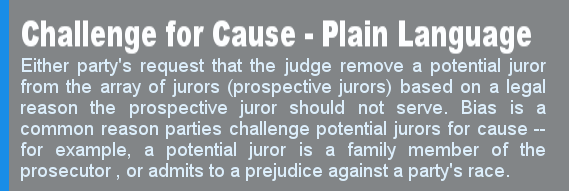Challenge for Cause – Jury Selection Process
Getting Rid of Bad Eggs

In Texas state courts jury selection is primarily conducted by the attorney for the prosecution and the criminal defense attorney. “Selection” is somewhat of a misnomer. Instead of actually selecting jurors, some prospective jurors are disqualified for legal reasons, then each side has a chance to “strike” a certain number (3 in misdemeanor trial and 10 in felony trials) of prospective jurors for practically any reason. Striking a prospective juror is a “challenge for cause.” Challenge for cause definition: an objection made to a particular person, alleging some fact making that person incapable or unfit to serve on the jury. Tex. Crim. Proc. Code Art. 35.16.

Reasons to Challenge for Cause in Texas
A challenge for cause may be made by either the prosecutor or the defendant for any one of these reasons:
- The person isn’t legally qualified to vote in Texas and the county of the trial;
- The person has a theft conviction (misdemeanor or felony);
- The person is currently facing a legal charge for misdemeanor theft or a felony;
- The person is insane;
- The person has a disability (permanent or temporary) that renders the person unfit for jury service;
- The person is legally blind and the judge decides the person is not fit for jury service in the particular case;
- The person is a witness in the case;
- The person has served on the grand jury which indicted the case;
- The person has served on a trial jury in a former trial of the same case;
- The person has formed an opinion about the verdict in the case before hearing any actual evidence;
- The person cannot read or write; and
- The person has a bias or prejudice in favor of or against the defendant.
Defendant Challenges for Cause
A criminal defense attorney can also challenge for cause someone that is related within the third degree of consanguinity or affinity (blood or marriage) to the alleged victim in the case or the prosecutor. Finally, if a person has a bias or prejudice against any of the law applicable to the case upon which the criminal defendant is entitled to rely (a legal defense or legal reason for mitigation in punishment), then a criminal defense attorney can challenge the person for cause.
Developing the proper facts during jury selection can be very difficult. Many judges will interject and “rehabilitate” jurors if the judge believes a criminal defense lawyer is about to “make a record” that a person should be struck for cause. Not only do judges create barriers, but the prospective jurors themselves are often reluctant to provide truthful answers to questions. This might be because people are embarrassed to express their opinions, or they don’t really understand the question being asked.
Most experienced criminal defense attorneys will tell you that jury selection is the most important part of trial. Specifically, many lawyers believe effectively getting rid of jurors with challenges for cause is the most important part of trial. Simply, if a person already has beliefs or feelings that are harmful to a criminal defendant, then it is nearly impossible for even the best attorney to change that during the course of trial.